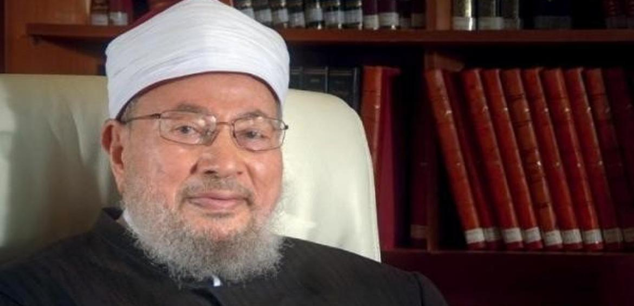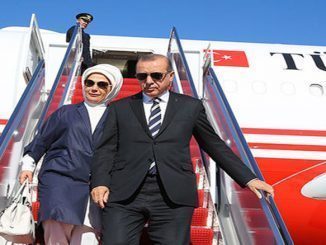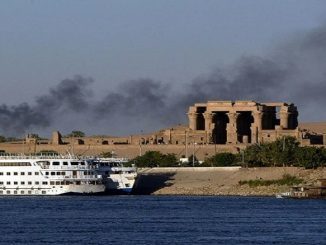
Most influential Muslim scholar Sheikh Yusuf al-Qaradawi died Monday at age 96, according to his official Twitter account.
The tweet on Sheikh Yusuf Al-Qaradawi’s official Twitter account read:
His Eminence Imam Yusuf al-Qaradawi who spent his life in explaining the provisions of Islam, and defending his nation passed away today to the mercy of God. We ask God to raise his ranks in high ranks and make him join the prophets, the truthful ones, the martyrs and the righteous…
Also, the Doha-based International Union for Muslim Scholars (IUMS) also confirmed in a tweet the death of Dr. Yusuf al-Qaradawi, an Egypt-born cleric who was based in Qatar.
The tweet on the official Twitter account of the International Union for Muslim Scholars read:
His Eminence, Imam Yusuf Al-Qaradawi, the founding president of the International Union of Muslim Scholars (IUMS), who dedicated his life to serving Islam and Muslims.
The Islamic nation has lost one of its most sincere and distinguished scholars. We ask God Almighty, to forgive him, have mercy on him, pardon him, and reward him with the best reward.
Shekh Qaradawi’s son, the poet Abdul Rahman Yusuf briefly announced death of his father, tweeting: “The knight got off his horse”
Dr. Qaradawi, who was founder and former chairman of the International Union of Islamic Scholars, a global union of Islamic intellectuals and clerics, is the Islamic world’s most renowned cleric and public intellectual, who publicly backed the 2011 Arab Spring uprisings in Egypt and across the Arab world.
Qaradawi was born on 9 September 1926 in the village of Saft Turab in Egypt’s Nile Delta governorate of Gharbia.
He was educated at al-Azhar University in Cairo, the Islamic world’s most prestigious religious institution, completing both his higher education and post-graduate studies in the same university until he obtained his PhD in 1973, with a focus on zakat tax and its social impacts.
Born in an Egypt that was still under British colonial rule, Qaradawi went on to become an anti-colonial activist, which led to his repeated detention by the government.
Qaradawi was jailed for expressing his opinion both under King Farouk in the 1940s and President Gamal Abdel Nasser’s rule in the 1950s.
Qaradawi eventually moved to Qatar in 1961, and was appointed dean of the faculty of Sharia at the newly established Qatar University. Qatar then granted him citizenship in 1968.
Later he was a regular guest at the Doha-based Al Jazeera channel, and his appearance on the network’s main religious show, Sharia and Life, garnered millions of views from around the world.
The scholar returned to Egypt briefly in 2011, after the pro-democracy revolution that forced President Hosni Mubarak out of power.
On 18 February that year, days after the resignation of Mubarak, Qaradawi led the Friday prayer with thousands of Egyptians gathering in Tahrir Square, the epicentre of the uprising in Cairo.
He addressed the sermon to both Muslims and Christians taking part in the protests. His first public appearance after decades in exile was viewed as highly symbolic of the freedoms that could be enshrined in post-revolution Egypt.
Qaradawi supported democracy and the participation of political Islamic groups in elections. He also backed Hamas, the Palestinian movement that rules the Gaza Strip.
However, he denounced groups like al-Qaeda and the Islamic State as extremists.
Qaradawi was an opponent of the takfiri ideology embraced by Salafi-jihadist clerics, which accuses other Muslims of apostasy or prohibits peace with non-Muslims.
His 2009 book The Law of Jihad outlined his criticism of the Salafi-jihadist ideology, and his support for international law and the United Nations.
His works have expressed commitment to pluralism and respect for the rights of minorities, and also urged Muslims living in western countries to respect their local laws.
He also advocated greater rights for women, and issued a religious ruling strictly prohibiting female genital mutilation, a practice that is often justified by hardline religious figures.
Dr Qaradawi was also vocal on the conflict in Syria over the past decade, where the regime of Bashar Al-Assad brutally cracked down on peaceful protestors, killed hundreds of thousands of civilians, detained and tortured to death tens of thousands, and forcibly disappeared over 135,000 individuals.
In 2013, in particular, following one of the notorious chemical weapons attacks on civilians by the Assad regime, Qaradawi called “every Sunni Muslim with any military training to go and fight” against Syrian forces and their allies.
Qaradawi openly condemned the 2013 military coup against the democratically-elected President Mohammed Morsi and opposed the new government under Abdel Fattah al-Sisi.
Following his condemnation, he was unable to return to Egypt for a second time, after his first exile prior to the 2011 revolution.
Also, Qaradawi’s daughter, Ola al-Qaradawi, was detained on 30 June 2017 in Egypt, shortly after the economic blockade of Qatar began.
However, she was released four years later, although her husband Hossam Khalaf remains in prison.
The couple was accused of links to the Muslim Brotherhood, which Egypt banned and branded as a “terrorist organization” after Sisi’s coup in 2013. Ola al-Qarawadi denies the accusations, branding them politically motivated.
Sheikh Qaradawi authored more than 120 books, including his most famous Al–Halal Al-Haram Fil–Islam.
Turkish President Recep Tayyip Erdogan offered his condolences in a phone call with Dr. Qaradawi’s son Abdul Rahman Yusuf, according to the Turkish presidency.
Erdogan said al-Qaradawi displayed the “most beautiful example” of how a Muslim should live, and that the late scholar never compromised on what he believed in throughout his life.
Abdul Rahman Yusuf, for his part, thanked President Erdogan and noted that a commemorative event would be held in Istanbul next week.
Lolwah Al-Khater, the assistant foreign minister of Qatar, mourned Sheikh Al-Qaradawi, saying: “We mourn to the Islamic nation the scholar, the revamped scholar Dr. Yusuf Al-Qaradawi, who dedicated his life to serving the religion of God, and he did not fear the blame of any blamer, for God.”…
The Qatari writer, Jaber Al-Harami, said that with the demise of Al-Qaradawi the nation lost one of its most prominent scholars, known for his defense of the nation’s causes.
The head of the Tunisian Renaissance movement, Rashed Ghannouchi, said in a post on his Facebook account that the deceased had given his life for explaining the provisions of Islam and defending his nation, stressing the principle of moderation and moderation in this great religion.

Ghannouchi offered his condolences to the family of the deceased in particular, and to the Arab and Islamic nation in general.
In 2008, Al-Qaradawi was ranked third among 20 personalities on the list for the most influential thinkers in the world, in a poll conducted by Foreign Policy and Prospect.
When publishing the poll, Foreign Policy said that Sheikh Al-Qaradawi “through the Sharia and Life program broadcast by Al-Jazeera satellite channel, issues weekly fatwas that address all aspects of life.”
Al-Qaradawi has authored more than 170 books, and has participated in many conferences, seminars and television programs during his scientific and advocacy career.



